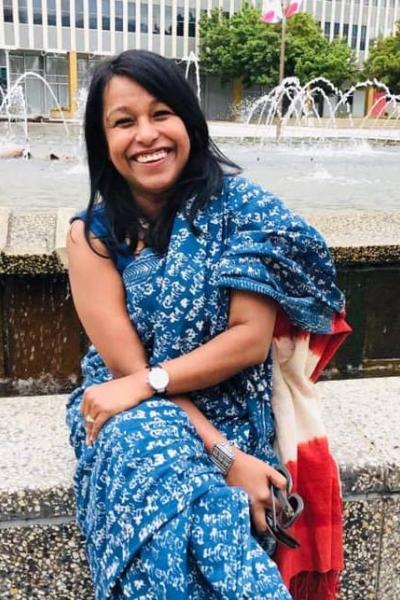
Prof Bina D'Costa
Bina D'Costa is a Professor at the Department of International Relations, Coral Bell School of Asia-Pacific Affairs at the Australian National University. At the height of Europe’s refugee emergency, she moved to the UNICEF Office of Research-Innocenti to build its Migration and Displacement program (2016-2018).
As a UN staff member, Bina has worked in South and Southeast Asia, Eastern and Southern Africa, and the Middle East. Her research interests span migration, children and conflict, gender, human rights and justice. She has undertaken studies on refugees, stateless communities and IDPs, and has provided inputs and technical advice to Human Rights bodies, UN agencies and NGOs. Most recently, she has served in UNICEF’s Rohingya Emergency Response Team in Cox’s Bazar Bangladesh. Her publications include books- Cascades of Violence: War, Crime and Peacebuilding Across South Asia (co-authored with John Braithwaite, ANU Press, 2018); Children and Violence: The Politics of Conflict in South Asia (Cambridge University Press, 2016); Children and Global Conflict (co-authored with Kim Huynh and Katrina Lee-Koo, Cambridge University Press, 2015); Nationbuilding, Gender and War Crimes in South Asia (Routledge, 2011, 2013); Marginalisation and Impunity: Violence against Women and Girls in the Chittagong Hill Tracts (CHTC and IWGIA, 2014, 2016); and Gender and the Global Politics of the Asia-Pacific (co-editor with Katrina Lee-Koo, Palgrave, 2010).
She has held visiting fellowships at the Graduate Institute for International and Development Studies, Geneva (2012-14); the Refugee Studies Center, Oxford University (2011-12) and the Global Justice Center, New York (2008). Bina has also served as the Asia Rapporteur for the Asia-Europe 55 member states ASEM global meeting on Children and Human Rights in 2017. Also, she has contributed to policy research in OHCHR (Office of the High Commissioner for Human Rights), the UNRISD (United Nations Research in Social Development), AUSAID (now in DFAT), USAID and UKAID (Department for International Development, UK).
Research Interest
Bina's current large research focuses on displaced children's protection in global humanitarian emergencies with deep dives through human rights framing in trafficking/smuggling, child/early marriage, child labor and gender justice issues. This project also draws on SDG indicators for data and evidence. This research initiative has received three generous seed-funding from the ANU strategic partnership scheme and APIP global collaborations scheme.
As a UN staff member, Bina has led large multi-country projects on children's protetion in forced migration, internal displacement and statelessness in three global emergencies- the Horn of Africa (Somalia, Sudan and Ethiopia), Europe's refugee 'crisis' and the Rohingya emergency.
As an academic, Bina specialised on War Crimes, Genocide and Struggles for Justice in South Asia; Human Rights Activism and Indigenous Politics in South Asia; Identity Politics and Conflicts (in particular sexual crimes and reproductive crimes in conflicts; children and conflict; refugees and conflict).
Snapshots of these academic projects are provided below:
Cascades of Violence: This large collaborative project with John Braithwaite was based on intensive fieldwork in Afghanistan, Bangladesh, Burma/Myanmar, India, Nepal, Pakistan and Sri Lanka.
Political Violence, Justice and Impunity: Bina’s large six country fieldwork based project is on political violence, impunity and human rights movements in South Asia. She has investigaed various ‘justice seeking’ processes/movements emerging in Afghanistan, Sri Lanka, Burma, Bangladesh, India and Pakistan. Some of the main themes were enforced disappearances, extrajudicial killing and sexual torture in the region.
Human Security and Borders: Bina is involved in various policy-oriented projects on borders, identity and human security, focusing on refugees, internally displaced persons (IDPs) and stateless people in South Asia. She works with Indigenous groups in the Chittagong Hill Tracts (CHT) and Northeast India, Rohingya, Tamil and Afghan refugee networks.
Children and War: Bina has conducted extensive field research on ‘war babies’ with special focus on the War of Liberation of Bangladesh in 1971 and the children of Partition of India. This project has developed largely out of Bina’s activist work. She is involved with human rights groups that focus on children's rights in South Asia.
REPRESENTATIVE SUBMISSIONS AND REVIEWS
Submission to the European Commission, Brussels, October 2014 'International Crimes Tribunal in Bangladesh and Civil Society Movements'
Submission to the Special Rapporteur on Violence against Women, Ms Rashida Manjoo on violence against indigenous women and girls in the Chittagong Hill Tracts in Bangladesh. Report of the Special Rapporteur on Violence against Women, its causes and consequences, United Nations General Assembly, Document A/HRC/26/38/Add.2, available at, www.ohchr.org/EN/HRBodies/HRC/.../A-HRC-26-38-Add2_en.doc This detailed report has also been published as an e-book and presented at the twelfth session of the UN Permanent Forum on Indigenous Issues (UNPFII) in New York, May 2013.
Submission to Mr Chaloka Beyani, the Special Rapporteur on the Human Rights of Internally Displaced Persons as the representative of the Asia-Pacific Forum on Women, Law and Development (APWLD) in 2012.
Review of the draft tool on Victim and Witness Protection in the War Crimes Tribunals in 2013 at the Office of the Human Rights Commissioner (OHCHR). Bina's evaluation focused on the tool’s effectiveness in responding to the needs of victims and witnesses of sexual and gender based violence who appear in war crimes tribunals, truth commissions and the International Criminal Court (ICC).
'On Sexual and Reproductive Crimes', interviewed as an expert witness at the International Crimes Tribunal in Bangladesh, 2011
UN Human Rights Council 24th Session, 'United Nations Security Council Resolution 1325 and the Protection Gap in Afghanistan and Pakistan'
TEACHING
Humanitarianism in World Politics; Global Governance and Migration; Peace, Conflict and War Studies; Human Security; Peacebuilding and Displacement; Security and International Relations of South Asia; Security and Strategic Studies; Gender, Conflict and Nationbuilding; Global Security; Gender, Globalisation and Development; Gender and Identity Politics.
TRAINING AND SHORT-TERM COURSE
Delivery and evaluation of customised training for refugee activist groups, especially human security and gender training; research methods including integrating gender mainstreaming policies; good practices case study development; and integration of human rights into country programs.